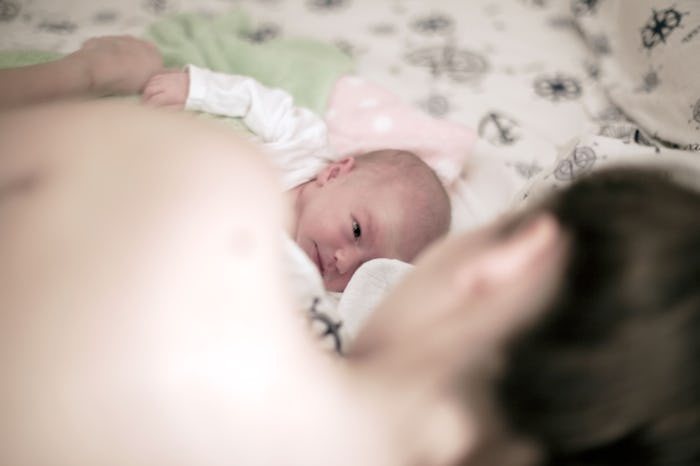Life

The Tiny Thing Sabotaging Your Mood When You Co-Sleep
Unless you have a particularly wiggly, always-fighting-sleep baby, or one who is prone to kicking and jabbing you in your ribs while you sleep, co-sleeping should give you lots of warm and fuzzy feelings. If, on the other hand, you're feeling less-than-cheerful when you're sleeping next to your precious bundle of joy, it's probably tine to consider this one, tiny thing that can affect your mood when you co-sleep. Even a relatively small factor can make the "sleep" part of co-sleeping hard to come by. In fact, your constant protective instinct can be hard to turn off, even when you know you need to sleep and even when your little one is sleeping right next to you.
According to The Atlantic, neurologists have found that mothers' brains begin to change even before they give birth. There is an increase in activity in the regions of the brain that controls empathy, anxiety, and social interactions, which combines with pregnancy and postpartum hormones to help a mom bond with her baby during pregnancy. Those changes can also increase feelings of innate protectiveness a mom feels toward her baby, though, and that natural increase can become difficult if not impossible for a mom to turn off.
While those changes are beneficial for moms and babies when it comes to forming an everlasting, unbreakable bond, it can also be exhausting for new moms and until they learn to control their overwhelming "mama bear" instinct. For some new moms, in fact, that constant feeling of dread and worry can manifest into postpartum depression and anxiety. According to Postpartum Support International, an estimated 10 percent of new moms suffer from postpartum anxiety.
"With postpartum anxiety, a mom may have constant worries about the baby's health and development, her ability to be a good parent, and how she's going to balance work and home or care for multiple children."
Some level of worry is normal, and most new moms learn to dismiss certain irrational, intrusive thoughts. For others, however, the anxiety can become all-consuming, especially when they aren't able to turn off the racing thoughts about their baby when they finally have time to lay down and attempt to go to sleep.
When you can't turn off the sense of worry of anxiety, especially with your baby sleeping right next to you, it might be time to speak with your doctor, as you could be suffering from postpartum anxiety.
The relentless combination of sleep deprivation and worry can become an inescapable cycle, even when you're co-sleeping. Sleep is closely related to your ability to function during the day, but it's also linked closely to your emotions. According to Harvard Health Publications, lack of sleep can increase your risk for depression and anxiety. If you aren't able to get enough quality sleep with your baby right next to you, you could be increasing your risk for postpartum depression or anxiety.
The purported benefits of co-sleeping can be mitigated by your inability to get quality sleep. If you aren't able to sleep with your baby next to you, consider taking a few nights off to reset your sleep schedule and get back to neutral before bringing baby back into your bed.